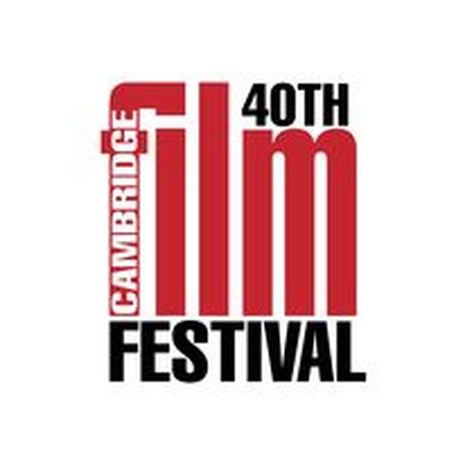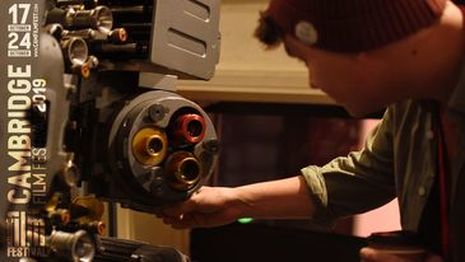Bringing The Cambridge Film Festival back together with the University
Film&TV columnist Abigail Reeves recommends films to watch at the upcoming CFF in light of her experience volunteering for the festival

Just missed out on the London film festival in the busy first weeks of term? Not quite committed enough to travel to Cannes, or Venice? Film lovers, do not fear, as the next film festival is taking place in our very own Cambridge. The CFF (Cambridge Film Festival) is the third longest-running film festival in the UK, celebrating its 40th anniversary this year. Taking place from the 18th to the 25th of November, it showcases a wide variety of highly anticipated new releases, a broad selection of the best of foreign films as well as enough art-house pictures to satisfy even the most alternative of movie buffs.
The first CFF happened in 1977 and immediately set its high standards for diversity, innovation and creating a space for world cinema to be shown in England. David Jakes was the original programmer of the first event. Back then, the festival was hosted at the Arts Picturehouse, located in the market passage – the home of Mash today. The Cambridge University film festival, in those days, brought in up to 450 people for its film screenings and attracted the likes of Alfred Hitchcock and was run by David Hare, now an award-winning screenwriter. A collaboration between the University society and the local Picturehouse produced this festival which has since grown and developed into a three-location event that premiers big-name films such as Tarantino’s Reservoir Dogs, and attracts stars like Tilda Swinton, Gary Oldman and Amelie directors Jeunet and Caro.
"Today, the CFF is connected to the Youth Lab which welcomes any one aged 16 to 24 to join a community of film-makers and film-lovers"
Somewhere along these last 40 years, however, the close link between the festival and the University has been lost. Its humble beginnings with opening parties at Emmanuel College and no funding were turned into the great success it is today by Tony Jones, the festival’s director and driving force behind the program from 1981 until 2020. The festival had featured introspectives of different directors every year in its early days, giving audiences a chance to see new, exciting work on the big screen. From 1997 to 2000, the festival took a well-earned break and returned with a full programme and free outdoor screenings.

Since then, the festival has gone from strength to strength and new, spin-off groups have been established around it. Today, the CFF is connected to the Youth Lab which welcomes any one aged 16 to 24 to join a community of film-makers and film-lovers. I recently got involved with the Youth Lab myself and have had the opportunity to volunteer at the festival and join a team of passionate individuals from all walks of life. This way of getting involved in the festival is a way to bring the students back to the cinema and return to the festival’s roots in the university.
With the overwhelming amount of choice of films to see, here are my top picks for movies to prioritise when thinking what to watch over the festival-week:
The eyes of Tammy Faye
This biopic follows the dramatic rise of televangelist Tammy Faye whose messages of love and prosperity propelled her into the hearts of American audiences in the 1970s and 80s. She and her husband Jim Bakker, played by Andrew Garfield, construct an empire which eventually comes crashing down, all portrayed with pastel-toned glamour which contrasts with the dark world of commercialised faith. Tammy Faye’s garish flamboyance is fully embodied by Jessica Chastain who portrays the cultural icon with astounding depth.
Titane
Julia Ducournau first hit French cinemas with her bold and provocative film Raw and Titane, her second feature-length film, does not disappoint. Winning the Palme d’Or at Cannes this year, the film has been hailed as the latest body horror masterpiece which combines violence, eroticism, cars, comedy and, surprisingly, a soft tenderness. It has been described by the BBC as ‘the most shocking film of 2021’ and it is certainly not for the faint hearted, needing a content note for both sexual scenes and extreme violence. The film is tense and winding, shocking at every possible moment and yet maintaining a thematic consistency throughout. Ducournau is changing the game for a genre previously dominated by men and this film clearly carves out her place as a director to watch.
Flee
Originally premiering at Sundance earlier this year, Flee is an animated, documentary-style film which deals with themes of displacement and isolation. It brings to life the experience of a refugee who has fled from Afghanistan to Denmark, becoming an academic and only now telling the story of his journey. It has been successfully received, garnering praise for pushing the boundaries of genre as well as for its delicate story telling.
Petite Maman
Céline Sciamma has become a household name in the world of cinema for her compelling love story in Portrait of a Lady on Fire, and her follow-up film Petite Maman maintains the same consistent, enchanting focus on intimacy. It follows Nelly, an eight year old girl, in the aftermath of her grandmother’s death who is helping her parents clear out her mother’s childhood home. The film gently explores this grief and the comfort which is found through friendship. Described by critics as a ‘vanilla pudding film: sweet and soft while it’s there’, this gentle film is a perfect break from essay stress.
Salaryman
This documentary, made by Allegra Pacheco, explores Japan’s intensely toxic work culture that exists amongst white-collar workers in large corporations. Exposing the unethical work practices of the capitalist system, this film raises awareness about this phenomenon but also allows those affected to speak about their experiences. The Salaryman has become a prominent figure in Tokyo’s work culture, consistently being robbed of their individuality and seen as just another ‘cog in the machine’ which this documentary aims to critically portray, creating a space for these workers’ identities to be reasserted.
 News / Christ’s announces toned-down ‘soirée’ in place of May Ball3 February 2026
News / Christ’s announces toned-down ‘soirée’ in place of May Ball3 February 2026 News / Deborah Prentice overtaken as highest-paid Russell Group VC2 February 2026
News / Deborah Prentice overtaken as highest-paid Russell Group VC2 February 2026 Fashion / A guide to Cambridge’s second-hand scene2 February 2026
Fashion / A guide to Cambridge’s second-hand scene2 February 2026 News / SU votes unanimously to support community kitchen4 February 2026
News / SU votes unanimously to support community kitchen4 February 2026 Comment / College rivalry should not become college snobbery30 January 2026
Comment / College rivalry should not become college snobbery30 January 2026










